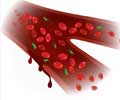Secret to sepsis may lie in basophils, a rare group of white blood cells, stated new research.

TOP INSIGHT
Research focused on certain aspects of basophil function could offer better ways to determine an individual's risk for sepsis or prevent the dysregulated immune response that can lead to sepsis.
Learning from the early stages of infection
To better understand the changes the immune system undergoes as an infection progresses into sepsis, a Seattle Children's team led by Piliponsky, along with collaborators from the Stanford University School of Medicine and other international labs, traced the immune response back to the early stages of infection.
They focused on a particular group of white blood cells called basophils known to help initiate an immune response to an infection.
"As one of the rarest cell types in the body, basophils make up less than 1% of a person's white blood cells," said Piliponsky, an associate professor of pediatrics at the University of Washington School of Medicine. "Scientists have long suspected that basophils can enhance the immune defense against a bacterial infection although there was no scientific proof of this role prior to our study."
Their studies showed that basophils were one of the first types of immune cell to appear at the infection site. The presence of basophils not only enhanced inflammation at the early stages of an immune response to infection and improved survival in mice, but did this in part by releasing a protein known as tumor necrosis factor (TNF).
"These findings show that basophils, despite their low numbers, can trigger a cascade of events that both helps them to initiate an immune response against infection and enhances the effectiveness of this response," wrote Piliponsky and his co-authors in the paper. "Together, these findings provide novel insights into how basophils, and basophil-derived TNF, might have key roles in the early stages following bacterial infections and in resisting the progression of such infections to sepsis."
Piliponsky believes these studies lay the groundwork for future projects.
Source-Eurekalert
 MEDINDIA
MEDINDIA



 Email
Email




